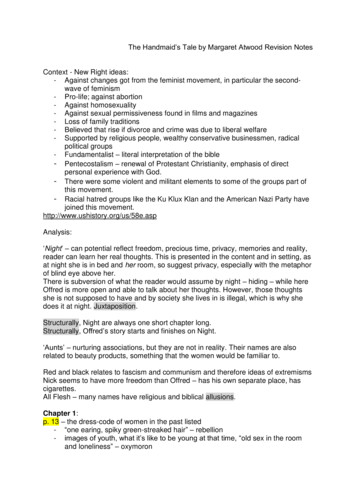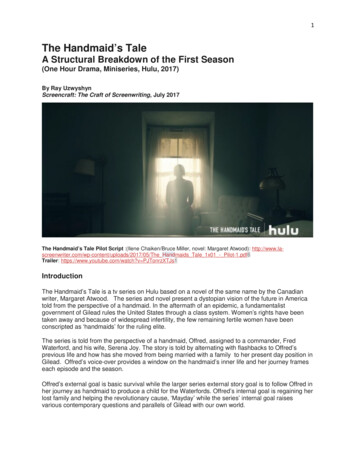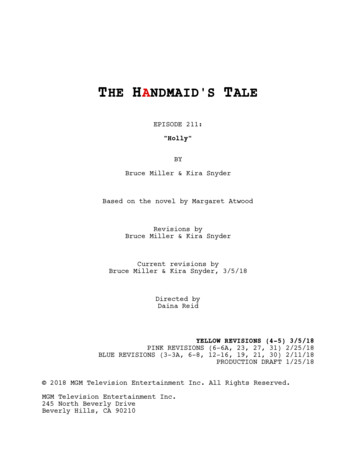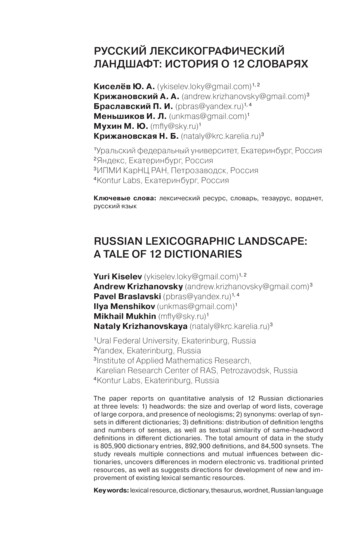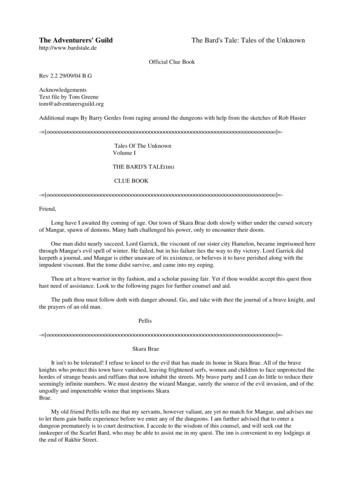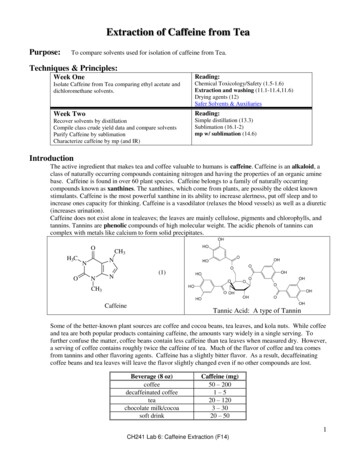
Transcription
Synopsis:First published in 1985, The Handmaid's Tale is a novel of such power that the reader is unable to forget its images and its forecast. Withmore than two million copies in print, it is Margaret Atwood's most popular and compelling novel. Set in the near future, it describes life in whatonce was the United States, now called the Republic of Gilead. Reacting to social unrest, and a sharply declining birthrate, the new regime hasreverted to — even gone beyond — the repressive tolerance of the original Puritans. Offred is a Handmaid who may leave the home of theCommander and his wife once a day to walk to food markets whose signs are now pictures instead of words because women are no longerallowed to read. She must lie on her back once a month and pray that the Commander makes her pregnant because she is only valued as long asher ovaries are viable. Offred can remember the years before, when she lived and made love with her husband, Luke; when she played with andprotected her daughter; when she had a job, money of her own, and access to knowledge. But all of that is gone now. Funny, unexpected, horrifying,and altogether convincing, The Handmaid's Tale is at once scathing satire, dire warning, and tour de force.
The Handmaid's Tale
Margaret Atwood 1985
NightCHAPTER 1We slept in what had once been the gymnasium. The floor was of varnished wood, with stripes and circles painted on it, for the games thatwere formerly played there; the hoops for the basketball nets were still in place, though the nets were gone. A balcony ran around the room, for thespectators, and I thought I could smell, faintly like an afterimage, the pungent scent of sweat, shot through with the sweet taint of chewing gum andperfume from the watching girls, felt-skirted as I knew from pictures, later in miniskirts, then pants, then in one earring, spiky green-streaked hair.Dances would have been held there; the music lingered, a palimpsest of unheard sound, style upon style, an undercurrent of drums, a forlorn wail,garlands made of tissue-paper flowers, cardboard devils, a revolving ball of mirrors, powdering the dancers with a snow of light.There was old sex in the room and loneliness, and expectation, of something without a shape or name. I remember that yearning, forsomething that was always about to happen and was never the same as the hands that were on us there and then, in the small of the back, or outback, in the parking lot, or in the television room with the sound turned down and only the pictures flickering over lifting flesh.We yearned for the future. How did we learn it, that talent for insatiability? It was in the air; and it was still in the air, an after-thought, as we triedto sleep, in the army cots that had been set up in rows, with spaces between so we could not talk. We had flannelette sheets, like children's, andarmy-issue blankets, old ones that still said U.S. We folded our clothes neatly and laid them on the stools at the ends of the beds. The lights wereturned down but not out. Aunt Sara and Aunt Elizabeth patrolled; they had electric cattle prods slung on thongs from their leather belts.No guns though, even they could not be trusted with guns. Guns were for the guards, specially picked from the Angels. The guards weren'tallowed inside the building except when called, and we weren't allowed out, except for our walks, twice daily, two by two around the football field,which was enclosed now by a chain-link fence topped with barbed wire. The Angels stood outside it with their backs to us. They were objects offear to us, but of something else as well. If only they would look. If only we could talk to them. Something could be exchanged, we thought, some dealmade, some tradeoff, we still had our bodies. That was our fantasy.We learned to whisper almost without sound. In the semi-darkness we could stretch out our arms, when the Aunts weren't looking, and toucheach other's hands across space. We learned to lip-read, our heads flat on the beds, turned sideways, watching each other's mouths. In this waywe exchanged names, from bed to bed: Alma. Janine. Dolores. Moira. June.
ShoppingCHAPTER 2A chair, a table, a lamp. Above, on the white ceiling, a relief ornament in the shape of a wreath, and in the center of it a blank space, plasteredover, like the place in a face where the eye has been taken out. There must have been a chandelier, once. They've removed anything you could tie arope to.A window, two white curtains. Under the window, a window seat with a little cushion. When the window is partly open — it only opens partly —the air can come in and make the curtains move. I can sit in the chair, or on the window seat, hands folded, and watch this. Sunlight comes inthrough the window too, and falls on the floor, which is made of wood, in narrow strips, highly polished. I can smell the polish. There's a rug on thefloor, oval, of braided rags. This is the kind of touch they like: folk art, archaic, made by women, in their spare time, from things that have no furtheruse. A return to traditional values. Waste not want not. I am not being wasted. Why do I want?On the wall above the chair, a picture, framed but with no glass: a print of flowers, blue irises, watercolor. Flowers are still allowed, Does eachof us have the same print, the same chair, the same white curtains, I wonder? Government issue?Think of it as being in the army, said Aunt Lydia.A bed. Single, mattress medium-hard, covered with a flocked white spread. Nothing takes place in the bed but sleep; or no sleep. I try not tothink too much. Like other things now, thought must be rationed. There's a lot that doesn't bear thinking about. Thinking can hurt your chances, and Iintend to last. I know why there is no glass, in front of the watercolor picture of blue irises, and why the window opens only partly and why the glass init is shatterproof. It isn't running away they're afraid of. We wouldn't get far. It's those other escapes, the ones you can open in yourself, given acutting edge.So. Apart from these details, this could be a college guest room, for the less distinguished visitors; or a room in a rooming house, of formertimes, for ladies in reduced circumstances. That is what we are now. The circumstances have been reduced; for those of us who still havecircumstances.But a chair, sunlight, flowers: these are not to be dismissed. I am alive, I live, I breathe, I put my hand out, unfolded, into the sunlight. Where I amis not a prison but a privilege, as Aunt Lydia said, who was in love with either/or.The bell that measures time is ringing. Time here is measured by bells, as once in nunneries. As in a nunnery too, there are few mirrors.I get up out of the chair, advance my feet into the sunlight, in their red shoes, flat-heeled to save the spine and not for dancing. The red glovesare lying on the bed. I pick them up, pull them onto my hands, finger by finger. Everything except the wings around my face is red: the color of blood,which defines us. The skirt is ankle-length, full, gathered to a flat yoke that extends over the breasts, the sleeves are full. The white wings too areprescribed issue; they are to keep us from seeing, but also from being seen. I never looked good in red, it's not my color. I pick up the shoppingbasket, put it over my arm.The door of the room — not my room, I refuse to say my — is not locked. In fact it doesn't shut properly. I go out into the polished hallway,which has a runner down the center, dusty pink. Like a path through the forest, like a carpet for royalty, it shows me the way.The carpet bends and goes down the front staircase and I go with it, one hand on the banister, once a tree, turned in another century, rubbed toa warm gloss. Late Victorian, the house is, a family house, built for a large rich family. There's a grandfather clock in the hallway, which doles outtime, and then the door to the motherly front sitting room, with its flesh tones and hints. A sitting room in which I never sit, but stand or kneel only. Atthe end of the hallway, above the front door, is a fanlight of colored glass: flowers, red and blue.There remains a mirror, on the hall wall. If I turn my head so that the white wings framing my face direct my vision towards it, I can see it as I godown the stairs, round, convex, a pier glass, like the eye of a fish, and myself in it like a distorted shadow, a parody of something, some fairy-talefigure in a red cloak, descending towards a moment of carelessness that is the same as danger. A Sister, dipped in blood.At the bottom of the stairs there's a hat-and-umbrella stand, the bentwood kind, long rounded rungs of wood curving gently up into hooksshaped like the opening fronds of a fern. There are several umbrellas in it: black, for the Commander, blue, for the Commander's Wife, and the oneassigned to me, which is red. I leave the red umbrella where it is, because I know from the window that the day is sunny. I wonder whether or not theCommander's wife is in the sitting room. She doesn't always sit. Sometimes I can hear her pacing back and forth, a heavy step and then a light one,and the soft tap of her cane on the dusty-rose carpet.I walk along the hallway, past the sitting room door and the door that leads into the dining room, and open the door at the end of the hall and gothrough into the kitchen. Here the smell is no longer of furniture polish. Rita is in here, standing at the kitchen table, which has a top of chipped whiteenamel. She's in her usual Martha's dress, which is dull green, like a surgeon's gown of the time before. The dress is much like mine in shape, longand concealing, but with a bib apron over it and without the white wings and the veil. She puts on the veil to go outside, but nobody much cares whosees the face of a Martha. Her sleeves are rolled to the elbow, showing her brown arms. She's making bread, throwing the loaves for the final briefkneading and then the shaping.Rita sees me and nods, whether in greeting or in simple acknowledgment of my presence it's hard to say, and wipes her floury hands on herapron and rummages in the kitchen drawer for the token book. Frowning, she tears out three tokens and hands them to me. Her face might bekindly if she would smile. But the frown isn't personal: it's the red dress she disapproves of, and what it stands for. She thinks I may be catching, likea disease or any form of bad luck.Sometimes I listen outside closed doors, a thing I never would have done in the time before. I don't listen long, because I don't want to becaught doing it. Once, though, I heard Rita say to Cora that she wouldn't debase herself like that.Nobody asking you, Cora said. Anyways, what could you do, supposing?Go to the Colonies, Rita said. They have the choice.With the Unwomen, and starve to death and Lord knows what all? said Cora. Catch you.
They were shelling peas; even through the almost-closed door I could hear the light clink of the hard peas falling into the metal bowl. I heardRita, a grunt or a sigh, of protest or agreement.Anyways, they're doing it for us all, said Cora, or so they say. If I hadn't of got my tubes tied, it could of been me, say I was ten years younger.It's not that bad. It's not what you'd call hard work.Better her than me, Rita said, and I opened the door. Their faces were the way women's faces are when they've been talking about you behindyour back and they think you've heard: embarrassed, but also a little defiant, as if it were their right. That day, Cora was more pleasant to me thanusual, Rita more surly.Today, despite Rita's closed face and pressed lips, I would like to stay here, in the kitchen. Cora might come in, from somewhere else in thehouse, carrying her bottle of lemon oil and her duster, and Rita would make coffee — in the houses of the Commanders there is still real coffee —and we would sit at Rita's kitchen table, which is not Rita's any more than my table is mine, and we would talk, about aches and pains, illnesses, ourfeet, our backs, all the different kinds of mischief that our bodies, like unruly children, can get into. We would nod our heads as punctuation to eachother's voices, signaling that yes, we know all about it. We would exchange remedies and try to outdo each other in the recital of our physicalmiseries; gently we would complain, our voices soft and minor key and mournful as pigeons in the eaves troughs. I know what you mean, we'd say.Or, a quaint expression you sometimes hear, still, from older people: I hear where you're coming from, as if the voice itself were a traveler, arrivingfrom a distant place. Which it would be, which it is.How I used to despise such talk. Now I long for it. At least it was talk. An exchange, of sorts.Or we would gossip. The Marthas know things, they talk among themselves, passing the unofficial news from house to house. Like me, theylisten at doors, no doubt, and see things even with their eyes averted. I've heard them at it sometimes, caught whiffs of their private conversations.Stillborn, it was. Or, Stabbed her with a knitting needle, right in the belly. Jealousy, it must have been, eating her up. Or, tantalizingly, It was toiletcleaner she used. Worked like a charm, though you'd think he'd of tasted it. Must've been that drunk; but they found her out all right.Or I would help Rita make the bread, sinking my hands into that soft resistant warmth which is so much like flesh. I hunger to touch something,other than cloth or wood. I hunger to commit the act of touch.But even if I were to ask, even if I were to violate decorum to that extent, Rita would not allow it. She would be too afraid. The Marthas are notsupposed to fraternize with us.Fraternize means to behave like a brother. Luke told me that. He said there was no corresponding word that meant to behave like a sister.Sororize, it would have to be, he said. From the Latin. He liked knowing about such details. The derivations of words, curious usage
First published in 1985, The Handmaid's Tale is a novel of such power that the reader is unable to forget its images and its forecast. With more than two million copies in print, it is Margaret Atwood's most popular and compelling novel. Set in the near future, it describes life in what once was the United States, now called the Republic of Gilead. Reacting to social unrest, and a sharply .File Size: 821KBPage Count: 90Explore further[PDF] Download The Handmaid’s Tale EBook Freeurpdfs.comMargaret Atwood - The Handmaids Tale.pdfdocs.google.comThe Handmaid’s Tale El Cuento de la Doncellanovelas.rodriguezalvarez.comDownload The Handmaid's Tale PDF Free & Read Onlineallbookshub.comDownload The handmaid's Tale PDF by Margaret Atwood 1985.pdforall.comRecommended to you based on what's popular Feedback
